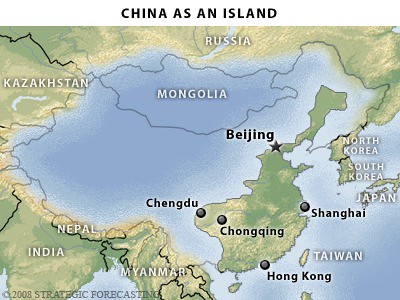
Jed Perl has a piece up attacking Chinese art at TNR. As any number of people have pointed out Contemporary Chinese ArtTM is booming. For Perl, however, it’s all totalitarian crap. I would actually agree with Perl that a lot of the stuff being produced by Chinese artists and purchased by China’s new ultra-rich (and their foreign buddies) is kinda questionable, and I certainly think that a lot of Chinese young people seem to be buying into a pretty sanitized view of Mao and the Communist period. The nostalgia for communist-period idealism you sometimes hear I always find hard to figure out.
For Perl, however, the only possible reason to think about China is to denounce Mao and the Cultural Revolution (which are of course the same thing.) Thus it becomes impossible for Chinese to be anything other than toadies unless they are in jail. The theme of “Revolution” comes up a lot in the art Perl is talking about, in part I think because he is talking about western collectors, who probably don’t know much about China but do know there was a revolution and in part because lots of Chinese artists do use Communist iconography and themes from the past. Some of them are probably toeing the official line, some are subverting the official line, some are doing both, some think they are doing both but actually are not.1 For Perl though it is pretty easy. If you see anything that looks “China-y” it’s crap.
I have studied the catalogue of this collection, The Revolution Continues: New Art from China, and I am pretty confident that it is the most hateful art book published in my lifetime. For the revolution that is continuing is none other than the Cultural Revolution.
Really? The modern smiley-face authoritarianism of China is the same as the Cultural Revolution? One begins to suspect he does not know much about the CR, which is pretty rapidly confirmed as he scoffs as a curator for suggesting that
“reprising the Red Guards’ antiauthoritarian stance to art, sought to bring down the institution of art itself through Dadaist strategies”?
Perl asks
In what sense, pray tell, was the Red Guard anti-authoritarian?
“Pray tell” suggests that he has no clue what the Red Guards were. The first thing a youth was supposed to do after strapping on the red armband was to “bombard the headquarters” and attack the authorities that actually controlled their lives, teachers, party bosses, etc. Everyone in China over a certain age knows this, which is why it is always so hard to figure out what Chinese artists might be doing with Mao images or CR images or whatever. Not everybody in the world needs to know (or can know) all the things Maoist references can mean in China, but if you are going to write about Chinese art it helps to have some idea what you are talking about. One can imagine touring the Louvre with Perl and having him be stumped by why there were all those pictures of a lady holding a baby. The only tool Perl has for understanding Chinese art is “Radical Chic” which may be useful for understanding why Westerners are buying this stuff but does not help much for understanding the art. After all, the main market for Chinese art is China. Why are wealthy Chinese (many of whom did not have much fun in the Maoist period) buying this stuff?
At the top of this post is a painting by Zhang Xiaogang. Perl..
His paintings are said to reflect the tensions of the Cultural Revolution, when children were known to turn their parents in to the authorities. In the Louisiana catalogue, this schlock is described as showing people “isolated in their own emotional universes” or shaped by, “mysterious, unknowable forces.” The only mysterious force from which Zhang is isolated is the art of painting.
I actually find it an interesting piece, in part because the isolation from family and others is a theme that always comes up in Cultural Revolution memoirs. Maybe Zhang is a hack, but I’m pretty sure I am not going to take Jed Perl’s word on that without something to back it up. Perl again
By aestheticizing historic catastrophe, the art world’s unholy synthesis of Maoism and kitsch enables people to blur their own memories.
That’s pretty bold for an American. What should Chinese people do? Commit mass suicide to prove they are free of the Maoist taint? Abandon art for a few centuries? There are lots of ways for Chinese artists and people to deal with the past, including ignoring it, but lumping every Chinese artist from Wang Guangyi to Cai Guoqiang in with the Red Detachment of Women is just sloppy.
I suppose what is particularly depressing is that with a minimal amount of effort Perl could have found lots of Chinese artists denouncing the people he talks about as talentless hacks and sell-outs. Had he been writing about British art or French art or maybe ever Japanese art he probably would have done so, or his editor would have sent him back to do it. He then could have written something interesting and informative.2







